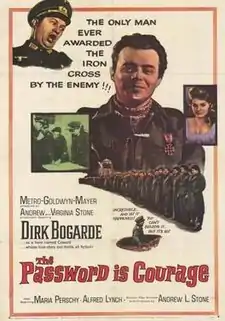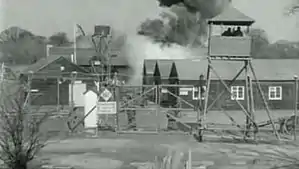The Password Is Courage
The Password Is Courage is a 1962 black-and-white film from Metro-Goldwyn-Mayer, based on John Castle's 1954 World War II memoir of the same name. Written, produced, and directed by Andrew L. Stone, the film stars Dirk Bogarde, Maria Perschy, and Alfred Lynch. It is a lighthearted take on the true story of Sergeant-Major Charles Coward, written under the pseudonym John Castle by Ronald Charles Payne and John Williams Garrod.
| The Password is Courage | |
|---|---|
 Theatrical release poster | |
| Directed by | Andrew L. Stone |
| Produced by | Andrew L. Stone |
| Screenplay by | Andrew L. Stone |
| Based on | The Password is Courage (1954) by John Castle (pseud.) |
| Starring | Dirk Bogarde Maria Perschy Alfred Lynch |
| Music by | Virginia L. Stone Derek New Christopher Stone Tommy Riley |
| Cinematography | Davis Boulton |
| Edited by | Noreen Ackland |
Production company | Andrew L. Stone Productions MGM |
| Distributed by | MGM |
Release date |
|
Running time | 116 minutes |
| Country | United Kingdom |
| Language | English |
Plot
Sergeant-Major Charles Coward (Dirk Bogarde) is a senior British NCO incarcerated in the prisoner of war camp Stalag VIII-B. He encourages his fellow inmates to escape, and tries to humiliate the German army guards at every opportunity.
When he was being transferred to Stalig VIII-B, the injured Coward escaped from a forced POW march, finding refuge in a French farmhouse and barn that is soon requisitioned by a German army unit needing to set up a field hospital. Inadvertently thought to be a wounded German soldier, Coward is taken to a hospital, where his identity is soon discovered, but not before he is awarded the Iron Cross as he lies in his hospital bed.
Coward is sent on to POW camp Stalig VIII-B, but on the way to the camp he engineers the total destruction of a passing enemy ammunition train using tossed bundles of straw, set on fire with his cigarette lighter. At the camp he is involved in the elaborate tunnel-digging schemes and plans an escape with fellow prisoner Bill Pope (Alfred Lynch). Unfortunately an older, closed tunnel is discovered by camp officials, but not their primary tunnel. Coward then attempts to deceive his camp commander and Luftwaffe officials that he has knowledge of a secret allied bomb sight. He receives special favours, which he uses to bribe guards to get vital materials needed for the coming escape.
When his ruse is discovered Coward is transferred to a Polish work camp where he is set up by the Germans as a traitor, with the camp's commanding officer trying to use his fellow British prisoners to kill Coward. When the scheme fails, he blackmails the Unteroffizier (Reginald Beckwith), who thinks he was responsible for a devastating fire that Coward had actually engineered. Coward extracts an extraordinary privilege in being able to go to and from the neighbouring town without an escort. When he makes contact with an attractive Polish resistance agent (Maria Perschy), he attempts to leave Germany by rail with his new friend providing assistance, but he is captured at a railway station.[N 1]
After the failure of that escape, Coward and his other escape partner, Pope, are assigned to the IG Farben work camp. They manage to escape again by masquerading as workmen clearing rubble in a rural area. After learning that the American front line is only a mile away, they steal an unattended fire engine in order to get past the enemy soldiers blocking their escape. Their plan works. A German troop convoy on the road moves aside to allow them to speed past to get to a non-existent fire, and they drive off to freedom.
Cast
- Dirk Bogarde as Sergeant-Major Charles Coward
- Maria Perschy as Irena
- Alfred Lynch as Corporal Bill Pope
- Nigel Stock as Cole
- Reginald Beckwith as Unteroffizier
- Richard Marner as Schmidt
- Ed Devereaux as the Aussie
- Lewis Fiander as Pringle
- George Mikell as Necke
- Richard Carpenter as Robinson
- Bernard Archard as first prisoner of war
- Ferdy Mayne as first German officer at French farm
- George Pravda as second German officer at French farm
- Olaf Pooley as German doctor
- Michael Mellinger as Feldwebel
- Colin Blakely as first German goon
- Margaret Whiting as French farm woman
- Mark Eden as second prisoner of war
- Douglas Livingstone as Bennett
- Arnold Marlé as Old Man on Train
- Charles Durning as American GI (uncredited)
Cast notes: Richard Marner appeared in the role of German officer Schmidt; he later played another German officer in the 1980s BBC comedy 'Allo, 'Allo!.
Production

The Password Is Courage is based on John Castle's biography of Sergeant-Major Charles Coward. Serving as technical advisor during the filming, Coward also has a cameo in the film during a party scene. The film is shot entirely in England; street scenes were filmed in the Chiltern market towns of Amersham and Chesham.[2]
The film raised some debate among ex-prisoners of war. There are no known survivors of any of Coward's escapes, and the National Ex-Prisoner of War Association (in its Autumn 2006 newsletter) suggested that some of the stories in his biography might have happened to other men in the camps, with some events "borrowed" for the book and for the film.[3] In 2013, Shimon Peres, then president of Israel, disclosed that his father, Yitzchak Perski, who immigrated from Poland to Mandatory Palestine in 1932, had joined the British Army in 1939 and was captured by the Germans in Greece in 1941. Perski and Coward had been fellow prisoners, and Peres claimed that some episodes in the film were based on his father's exploits at that time.[4]
The original cinema version of The Password Is Courage contained a sequence set in Auschwitz concentration camp, illustrated by drawings.[5] This sequence has been cut from television broadcast prints, but a credit for the drawings remains listed in the film credits.[6][N 2]
Reception
The Password Is Courage received mixed reviews from critics because this true story of a prisoner of war was done in a jocular vein, and was considered inauthentic as a result. The review in Variety noted: "Andrew L. Stone’s screenplay, based on a biog of Sergeant-Major Charles Coward by John Castle, has pumped into its untidy 116 minutes an overdose of slapstick humour. Result is that what could have been a telling tribute to a character of guts and initiative, the kind that every war produces, lacks conviction".[7]
References
Explanatory notes
- Despite the film's title, the password Coward uses to identify the agent, an optometrist, turns out to be the phrase "cleaning cloths".
- Why the sequence has been cut is unknown. Suggested explanations include that the events described did not happen, that the sequence is inappropriate in an otherwise broad comedy, and that a shorter run time for television syndication required the removal of this self-standing sub-plot.
Citations
- Johnston, Trevor. "Review: 'The Password Is Courage'." Time Out London, 21 January 2014. Retrieved: 9 April 2016.
- Tanitch 1988, pp. 110–111.
- Allan, Les. "Charlie Coward." Archived 8 February 2012 at the Wayback Machine The National Ex-Prisoner of War Association Newsletter, Autumn 2006. Retrieved: 22 September 2013.
- Peres, Shimon. הסיפור המדהים של אבא שלי ("The astonishing tale about my father"). Yediot Aharonot, 27 January 2013.
- Morley 2000, p. 100.
- Castle 2002, p. 178.
- "Review: The Password Is Courage."Variety, 31 December 1961.
Bibliography
- Castle, John. The Password is Courage. London: Monarch Books, 2002, First edition: 1954. ISBN 978-0-28563-587-6.
- Morley, Sheridan. Dirk Bogarde: Rank Outsider. Pontarddulais, Swansea, UK: Macmillan Distribution Limited, 2000. ISBN 978-0-74754-698-6.
- Tanitch, Robert. Dirk Bogarde: The Complete Career Illustrated. London: Ebury Pres, 1988. ISBN 978-0-85223-694-9.
External links
- The Password Is Courage at the TCM Movie Database
- The Password Is Courage at IMDb
- The Password Is Courage at AllMovie
- The Password Is Courage at BritMovie (archived)